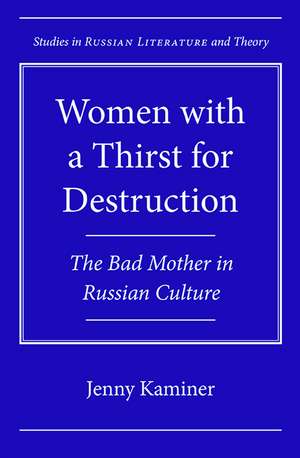Women with a Thirst for Destruction: The Bad Mother in Russian Culture: Studies in Russian Literature and Theory
Autor Jenny Kamineren Limba Engleză Hardback – 27 feb 2014
Winner, 2014 AWSS Best Book in Slavic/East European/Eurasian Women's Studies
In Russian culture, the archetypal mother is noble and self-sacrificing. In Women with a Thirst for Destruction, however, Jenny Kaminer shows how this image is destabilized during periods of dramatic rupture in Russian society, examining in detail the aftermath of three key moments in the country’s history: the emancipation of the serfs in 1861, the Russian Revolution of 1917, and the fall of the Communist regime in 1991. She explores works both familiar and relatively unexamined: Leo Tolstoy’s Anna Karenina, Mikhail Saltykov-Shchedrin’s The Golovlev Family, Fyodor Gladkov’s Cement, and Liudmila Petrushevskaia’s The Time: Night, as well as a late Soviet film (Vyacheslav Krishtofovich’s Adam’s Rib, 1990) and media coverage of the Chechen conflict. Kaminer’s book speaks broadly to the mutability of seemingly established cultural norms in the face of political and social upheaval.
In Russian culture, the archetypal mother is noble and self-sacrificing. In Women with a Thirst for Destruction, however, Jenny Kaminer shows how this image is destabilized during periods of dramatic rupture in Russian society, examining in detail the aftermath of three key moments in the country’s history: the emancipation of the serfs in 1861, the Russian Revolution of 1917, and the fall of the Communist regime in 1991. She explores works both familiar and relatively unexamined: Leo Tolstoy’s Anna Karenina, Mikhail Saltykov-Shchedrin’s The Golovlev Family, Fyodor Gladkov’s Cement, and Liudmila Petrushevskaia’s The Time: Night, as well as a late Soviet film (Vyacheslav Krishtofovich’s Adam’s Rib, 1990) and media coverage of the Chechen conflict. Kaminer’s book speaks broadly to the mutability of seemingly established cultural norms in the face of political and social upheaval.
Din seria Studies in Russian Literature and Theory
-
 Preț: 237.64 lei
Preț: 237.64 lei -
 Preț: 347.80 lei
Preț: 347.80 lei -
 Preț: 305.16 lei
Preț: 305.16 lei -
 Preț: 348.46 lei
Preț: 348.46 lei -
 Preț: 347.08 lei
Preț: 347.08 lei -
 Preț: 380.28 lei
Preț: 380.28 lei -
 Preț: 382.19 lei
Preț: 382.19 lei - 18%
 Preț: 919.93 lei
Preț: 919.93 lei - 18%
 Preț: 835.33 lei
Preț: 835.33 lei - 18%
 Preț: 836.12 lei
Preț: 836.12 lei -
 Preț: 354.61 lei
Preț: 354.61 lei -
 Preț: 271.39 lei
Preț: 271.39 lei - 23%
 Preț: 700.68 lei
Preț: 700.68 lei -
 Preț: 183.31 lei
Preț: 183.31 lei - 8%
 Preț: 358.95 lei
Preț: 358.95 lei -
 Preț: 172.79 lei
Preț: 172.79 lei - 8%
 Preț: 322.73 lei
Preț: 322.73 lei - 23%
 Preț: 618.38 lei
Preț: 618.38 lei - 23%
 Preț: 703.58 lei
Preț: 703.58 lei - 12%
 Preț: 270.07 lei
Preț: 270.07 lei - 18%
 Preț: 870.83 lei
Preț: 870.83 lei - 12%
 Preț: 270.07 lei
Preț: 270.07 lei - 13%
 Preț: 410.97 lei
Preț: 410.97 lei -
 Preț: 189.05 lei
Preț: 189.05 lei - 13%
 Preț: 357.48 lei
Preț: 357.48 lei - 65%
 Preț: 358.31 lei
Preț: 358.31 lei - 23%
 Preț: 706.59 lei
Preț: 706.59 lei - 16%
 Preț: 527.24 lei
Preț: 527.24 lei -
 Preț: 169.95 lei
Preț: 169.95 lei - 18%
 Preț: 838.07 lei
Preț: 838.07 lei - 11%
 Preț: 230.59 lei
Preț: 230.59 lei - 18%
 Preț: 837.07 lei
Preț: 837.07 lei - 13%
 Preț: 265.93 lei
Preț: 265.93 lei - 18%
 Preț: 835.92 lei
Preț: 835.92 lei - 18%
 Preț: 695.91 lei
Preț: 695.91 lei - 9%
 Preț: 357.55 lei
Preț: 357.55 lei -
 Preț: 287.13 lei
Preț: 287.13 lei - 14%
 Preț: 230.32 lei
Preț: 230.32 lei - 39%
 Preț: 158.33 lei
Preț: 158.33 lei - 14%
 Preț: 186.68 lei
Preț: 186.68 lei - 8%
 Preț: 358.87 lei
Preț: 358.87 lei - 23%
 Preț: 787.13 lei
Preț: 787.13 lei - 10%
 Preț: 236.57 lei
Preț: 236.57 lei - 23%
 Preț: 783.95 lei
Preț: 783.95 lei
Preț: 356.12 lei
Preț vechi: 390.66 lei
-9% Nou
Puncte Express: 534
Preț estimativ în valută:
68.14€ • 71.33$ • 56.72£
68.14€ • 71.33$ • 56.72£
Carte indisponibilă temporar
Doresc să fiu notificat când acest titlu va fi disponibil:
Se trimite...
Preluare comenzi: 021 569.72.76
Specificații
ISBN-13: 9780810129467
ISBN-10: 0810129469
Pagini: 208
Ilustrații: 2 b-w
Dimensiuni: 156 x 235 x 18 mm
Greutate: 0.41 kg
Ediția:New.
Editura: Northwestern University Press
Colecția Northwestern University Press
Seria Studies in Russian Literature and Theory
ISBN-10: 0810129469
Pagini: 208
Ilustrații: 2 b-w
Dimensiuni: 156 x 235 x 18 mm
Greutate: 0.41 kg
Ediția:New.
Editura: Northwestern University Press
Colecția Northwestern University Press
Seria Studies in Russian Literature and Theory
Notă biografică
Jenny Kaminer is an assistant professor of Russian at the University of California, Davis.
Descriere
In Russian culture, the archetypal mother is noble and self-sacrificing. In Women with a Thirst for Destruction, however, Jenny Kaminer shows how this image is destabilized during periods of dramatic rupture in Russian society, examining in detail the aftermath of three key moments in the country’s history: the emancipation of the serfs in 1861, the Russian Revolution of 1917, and the fall of the Communist regime in 1991.
